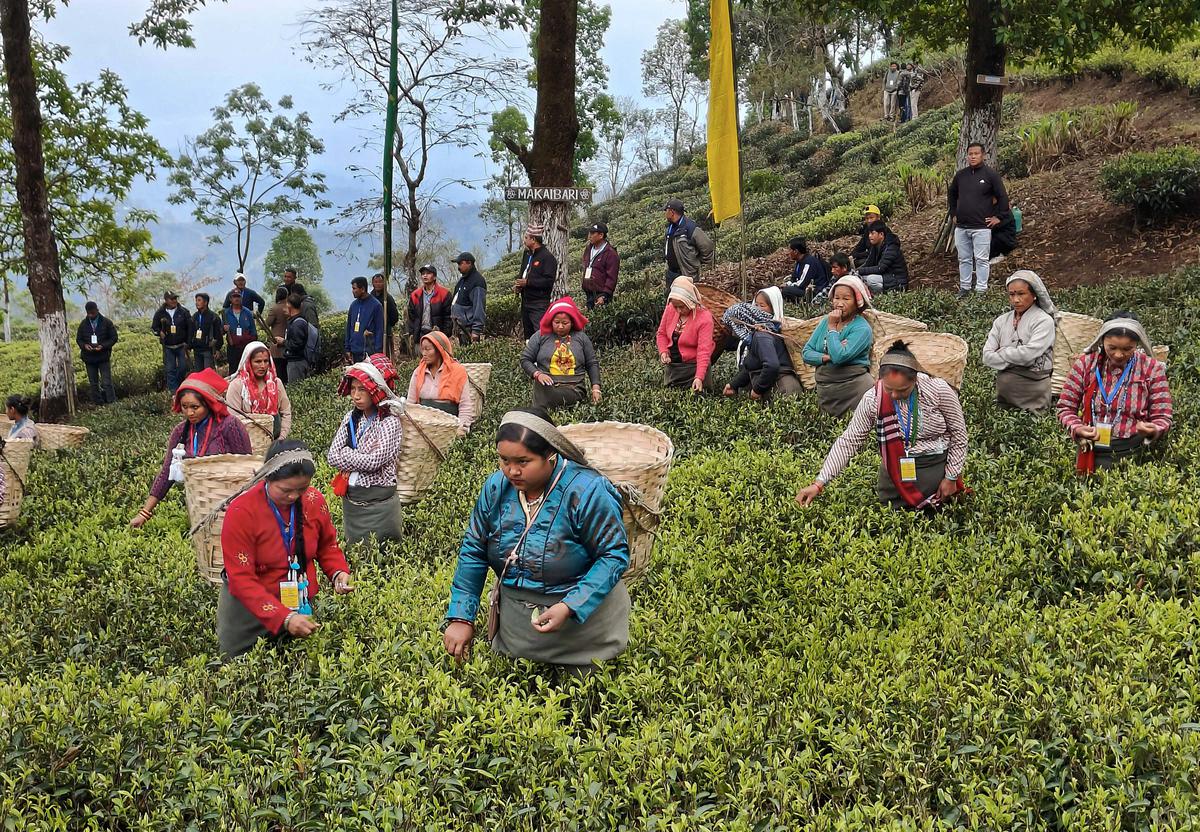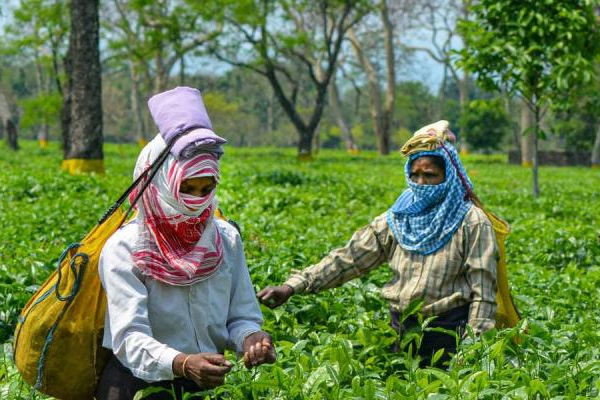Tea-The National Drink Of India And Its Manufacturers Suffers The Catastrophic Effects Of Climate Change.
Tea estate owners are trying to preserve their crops as extreme weather events become more frequent and unpredictable.

A catastrophe is unfolding slowly, almost undetected, behind the serene surroundings of Darjeeling’s legendary tea plantations, with gentle hills reaching green and pine trees brushing the heavens – climate change, harming output, the quality of the tea, and the health of hundreds of employees. With few statistics, the impact of climate change is possibly equally mysterious as the mist drifts in from time to time. But it is felt every day, according to activists and specialists working in the field.
The usage of pesticides and their influence on hydra is at the heart of the problem. Tea estate owners are trying to preserve their crops as extreme weather events become more frequent and unpredictable.

However, the increased use of chemical treatments hurts the health of individuals who labour in the gardens and the delicate flavour of the tea leaf and yields. One of the 34-year-old tea garden workers lacks a string of degrees and is not privy to estate decision-making, but she understands all too well why day-to-day living has become so complicated. She has trouble breathing, dermatitis on her hands and feet, and a persistent heaviness in her chest. Despite her numerous difficulties, she persists in gathering tea leaves.
Many tea estate owners have resorted to increasing the use of pesticides and insecticides in recent years to raise tea output, which has been dropping owing to droughts, irregular rainfall, and increased pest infestations. She says they are compelled to spray these chemicals without gloves or masks. And she is not the only one who is affected by this. Many workers have experienced the stress of both physical and mental diseases. They have repeatedly mentioned this issue to the managers but have yet to obtain assistance. Similar stories exist in the vast tea belt encompassing Siliguri and the Dooars.
While some gardens supply protective equipment like gloves and masks, many do not. According to Dr Amit Deshpande, founder and director of Activist Healthcare, prolonged chemical exposure can even be lethal in the long run, producing crippling diseases such as cancer and severe organ damage. The number of people working in these gardens varies according to their size. Small gardens employ around 250 tea workers, medium-sized estates 600, and big estates more than 900. The problems extend beyond the health concerns that tea estate employees endure.
Another person, Rupa Choudhary, criticises the reduction in productivity while methodically inspecting newly harvested tea leaves. According to Ms Choudhary, responsible for measuring and sorting through dried leaves, the first flush, which used to provide bountiful tea output throughout March and April, has considerably dropped due to droughts.

The shifting weather patterns have made it increasingly difficult to collect even two kilogrammes of high-quality tea leaves per day, a fraction of the six-seven kilogrammes per day harvested before 2015. Climate change has ramifications in every part of their life. For example, the effects of declining tea yields are reflected in their pay.
Sandeep Kumar Gupta and Partho Das Roy, the estate managers in the Dooars and Siliguri, share the workers’ feelings. The workers earn just 235 per day, which is hardly enough to get by. The growing cost of veggies and other necessities makes it even more difficult for them to support their families. Mr Gupta claims that irrigation expenditures have skyrocketed due to low rainfall, resulting in decreasing quantity and quality. Darjeeling tea is famous, but it now appears to be losing its authentic flavour, which they feel as exports have plummeted, he explained.
He denied using excessive chemicals to improve productivity, claiming that even herbicides and insecticides are ineffective and should not be used on the estate. Mr Roy went on to say that the first flush’s market value, famed for its clean and fresh flavour, has suffered the most. Due to a lack of winter rains and the failure of new buds and leaves to sprout, the unique bitter taste has been lost. The impact of the dangerous climate change on tea production is interconnected with the distinctive qualities of Darjeeling tea.
Misty hills, fertile soil, and enough rain have historically offered ideal circumstances for cultivating outstanding tea. However, as irregular weather patterns remain, desirable tastes associated with various tea flushes are threatened.
The second flush, with its muscatel and fruity overtones, and the monsoon flush, which has a fuller flavour, have been impacted. According to experts, the autumnal flush, the last harvest before winter, strives to rescue the tastes but faces obstacles. Planters say that production volumes in the 87-odd Darjeeling tea gardens have dropped from more than 8 million kilogrammes per year in 2016 to 6.5-7 million kilogrammes in 2022, mainly owing to ageing bushes, climate change, and insect infestations.
Darjeeling’s production and price realisations have declined, according to Indian Tea Association Secretary General Arijit Raha. He noted that the crop’s average auction price, 365.45 per kilogramme in 2021, will fall to 349.42 in 2022.
According to industry estimates, the Darjeeling tea business employs around 55,000 regular and 15,000 temporary workers.

How can the situation be turned around?
As climate change tightens its hold on Darjeeling’s tea estates, industry insiders wonder how the situation can be saved. Kaushik Bhattacharya, Director of the Darjeeling Tea Research & Management Association, emphasised preserving the soil’s organic balance, utilising appropriate shade trees, and balancing seed-grown and clonal tea plants. Mr Bhattacharya also emphasised addressing soil pH levels and insect and fungal disease control.
Bharat Prakash Rai, secretary of the Darjeeling-based FOSEP (Forum for Sustainable Environment and People), added that pesticide usage and unethical practices also contribute to the increasing impact of climate change. He says the garden growers emphasise quantity above quality, causing environmental and flora and fauna damage.
Above the plants, a healthy forest must exist to catch water vapour and provide moisture to the gardens. However, many kinds of wood have been burned to expand production regions. Likewise, the weather has turned extremely dry, and gardens have significant water scarcity.
Furthermore, the extensive usage of sticky chemicals for insect control has unforeseen consequences. While these compounds aided in protecting the plants, they also hampered pollination and, consequently, the national drink’s output. He believes a delicate balance between pest management and environmental sustainability must be maintained. The sticky material he refers to is a glue-like substance that is put into the trunks of trees to grab and trap insects and prevent them from climbing up and hurting the tree or its leaves.

Conclusion.
The tea business requires creative solutions. It must invest in branding and popularising India’s distinctive teas inside and outside the country. Because conventional markets are saturated, new markets must be created. Climate change has already occurred, and the consequences for individuals are unimaginable. It’s high time that good governance is the need of the hour. The state and local authorities should intervene and find innovative solutions to safeguard the national drink of India.




